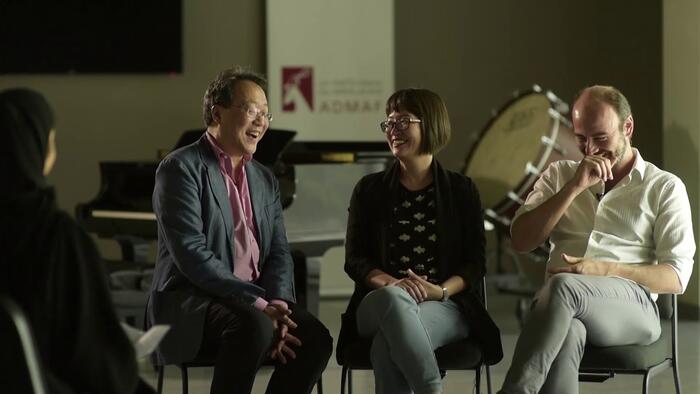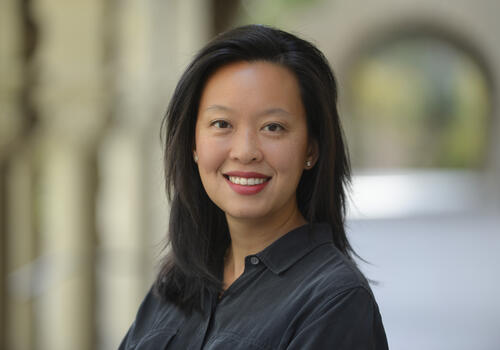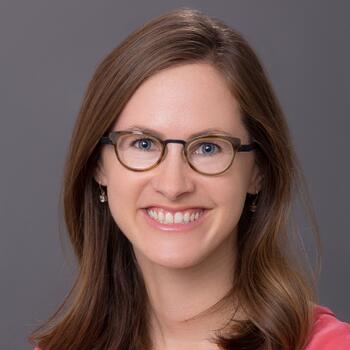Kawasaki City Mayor Norihiko Fukuda Delivers Inspirational Comments to Students
Mayor Norihiko Fukuda of Kawasaki City—the sixth most populous city in Japan—spoke during the closing ceremony of Stanford e-Kawasaki on March 29, 2022. The ceremony marked the end of the third-year offering of Stanford e-Kawasaki, which is taught by Instructor Maiko Tamagawa Bacha. Nineteen students representing Kawasaki High School and Tachibana High School successfully completed the course and each received a certificate from Mayor Fukuda as Bacha announced each student’s name.
Stanford e-Kawasaki focuses on two themes, entrepreneurship and diversity. In Mayor Fukuda’s comments to students, he noted that with people coming from across and outside of Japan to Kawasaki, the city has developed to become a city of 1.54 million people and one of the most diverse cities in Japan. Given this, Fukuda underscored the importance of having students value diversity, and stated, “I want young people in Kawasaki to appreciate this core value.” He continued,
This year’s course featured a diverse group of speakers, including a panel of Japan Exchange and Teaching (JET) Program alumni who spoke about diversity in the United States. The panelists included Jeffrey Fleischman, Cerell Rivera, and Kai Wiesner-Hanks, who spoke on topics such as ethnic diversity, gender equality and identity, religious diversity, and cultural diversity. Bacha is a former Advisor for Educational Affairs at the Consulate General of Japan in San Francisco and one of her major responsibilities was overseeing the JET Program. She commented, “It was particularly gratifying for me to provide a platform for JET alumni to continue to offer their support to students in Japan.” Other sessions were led by Dr. Stephen Murphy-Shigematsu who addressed the central question, “What is diversity?,” and also discussed diversity issues in Japan, and Stanford graduate student Alinea Tucker, who spoke on “Black Lives Matter.”
In the area of entrepreneurship, Miwa Seki, General Partner, M Power Partners, provided perspectives as an investor, and Sukemasa Kabayama, Founder and CEO of Uplift Labs, shared his journey as an entrepreneur in Japan and in the United States.
A highlight of the closing ceremony was the announcement of the two honorees of Stanford e-Kawasaki. They are Sayaka Kiyotomo from Kawasaki High School and Anne Fukushima from Tachibana High School.
Reflecting on the three years of teaching the course, Bacha noted, “Since the inception of Stanford e-Kawasaki, Mayor Fukuda’s unwavering commitment has without a doubt contributed greatly to the success of the course. The students and I have always felt his support.” After the ceremony, Mayor Fukuda brought the students to one of his meeting rooms and engaged them in informal discussions. His formal and informal comments were very inspirational to the students.
I am most grateful to Mayor Norihiko Fukuda for his vision and for making this course possible. I would also like to express my appreciation to Mr. Nihei and Mr. Katsurayama from the Kawasaki Board of Education; and Mr. Abe, Mr. Tanaka, Mr. Kawato, and especially Mr. Inoue from Kawasaki City for their unwavering support. Importantly, I would like to express my appreciation to Principal Iwaki and his staff of Kawasaki High School and Principal Takai and his staff from Tachibana High School for their engagement with Stanford e-Kawasaki. An article in Japanese about the closing ceremony that was published by Kawasaki City can be found here.

Read More
Stanford e-Kawasaki closing ceremony held.




 Silkroad Ensemble Musicians Yo-Yo Ma (cello), Haruka Fujii (percussion), and Kinan Azmeh (clarinet); photo courtesy Silkroad
Silkroad Ensemble Musicians Yo-Yo Ma (cello), Haruka Fujii (percussion), and Kinan Azmeh (clarinet); photo courtesy Silkroad


 Ambassador Rahm Emanuel; courtesy U.S. Embassy Tokyo
Ambassador Rahm Emanuel; courtesy U.S. Embassy Tokyo


















